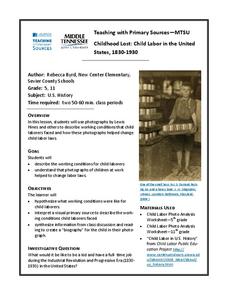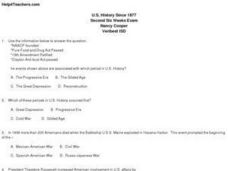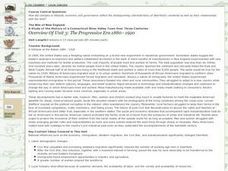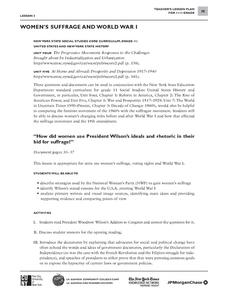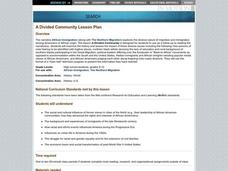Curated OER
How Did the Progressive Party affect American Society
Ninth graders explore the political views of the Progressive Party. In this U.S. History lesson, 9th graders read the "LaFollette Platform," then share their thoughts of the reading in a class discussion. To conclude the lesson, students...
Curated OER
Childhood Lost: Child Labor in the United States, 1830-1930
Working in groups, middle and high schoolers describe and discuss photographs depicting working conditions experienced by child laborers in the 19th century. They then write a persuasive paragraph supporting an amendment to regulate the...
Curated OER
Understanding The Progressives And Their Viewpoints
Eleventh graders explore the Progressive Era in American history (1900-1917). They use the internet and other sources to research the Progressive Movement, identify three Progressive presidents, and explore considered reforms. Students...
Alabama Department of Archives and History
Two Different African-American Visions: W.E.B. Du Bois and Booker T. Washington
The strategies civil rights activists Booker T. Washington and W.E.B. Du Bois proposed for blacks to achieve racial progress is the focus of an activity in which class groups identify the strategies as well as the benefits and drawbacks...
Curated OER
U.S. History Since 1877
Learners identify and analyze when the following occurred: the beginning of the NAACP, the enactment of the Pure Food and Drug Act, the ratification of the nineteenth Amendment, and the enactment of the Clayton Anti-trust Act. Students...
Curated OER
Progressive Newspapers
Students create a newspaper on local, state and national issues in the muckracking style of progessive era journalism. They research the style by reading articles from the time period on women's sufrage, child labor laws and political...
Curated OER
U.S. History: The Progressive Era
Students examine the Colonial Revival Movement as a response to industrialization and immigration. focusing on Deerfield, Connecticut, they create a documentary artifact reflecting the period.
Curated OER
Constitutional Change During the Progressive Era
Young scholars analyze the passage of the 16th through 19th amendments during the Progressive Era around the turn of the century. Using research skills, they write papers and create portfolios supporting and opposing the adoption of...
Curated OER
Stand Up and Sing: Music and Our Reform History
Students examine events of historical significance in music. In groups, they are given pieces of sheet music and work together to try to determine the social and political conditions of the time based on the lyrics. They write their own...
City University of New York
Woman's Suffrage and World War I
How did women use President Wilson's ideals and rhetoric in their bid for suffrage? To answer this essential question, class groups analyze primary written documents and visual images.
Curated OER
Sow the Seeds of Victory!
Pupils use the National Archives and Records Administration's records to research the history of the U.S. Food Administation.
Curated OER
Music of the Great Depression
Eleventh graders take a closer look at the music of the Great Depression. In this 1930's America lesson plan, 11th graders read and analyze the provided lyrics of 6 songs from the era. Students then compose their own lyrics for songs...
Curated OER
Child Labor in Maryland: An Historical Investigation
Tenth graders, after reading two excerpts about contemporary child labor situations, discuss two broad questions in detail along with the industrial boom following the Civil War conditions in the United States. They investigate how the...
Curated OER
A Divided Community
Students work in teams to research the history of African migration and immigration in the U.S. They present their research in a town hall discussion format and then write a paragraph about their experiences.
Curated OER
Racial Inequality: Remnants of a Troubled Time
Eighth graders study the ratification of the 14th Amendment and the Plessy v. Ferguson decision. In this US History activity, 8th graders read excerpts from the Brown v. Board of education decision. Students investigate one of three...
Smithsonian Institution
Mobilizing Children
Scholars find out how the government used propaganda to mobilize children to help in the war effort. Lesson exercises include analyzing a quote from Franklin Roosevelt, viewing propaganda images and posters, and participating in a lively...
Curated OER
Looking for Heroes
Pupils explain the importance of the 1965 Selma-to-Montgomery Voting Rights March and the long term impact in the US of non violent civic participation.
Curated OER
1968: Year of Social Change and Turning Point in Vietnam and the United States
Eleventh graders examine the year 1968 in Vietnam and the United States. They work together to research events which they create a timeline. They also read primary source documents of veterans of the Vietnam War.
Curated OER
Japaneses Internment: Lesson 1 of 4: Chronological Events Leading to Internment
Students examine facts about history of the Asians experience in America and identify patterns of Asian immigration in the United States. Students develop reasons specific Asian ethnic groups migrated to the United States and predict...
Curated OER
Gold Rush in Photos
Students examine historical images of the Alaskan Gold Rush and complete a worksheet to better explain this era. They create a PowerPoint related to the images.
Curated OER
Three Centuries of Child Labor In America
Fifth graders investigate the history of child labor that is found in America. They use a variety of resources to conduct research. Students create cause and effect arguments using the information that is found. They also compare and...
Curated OER
Women's Suffrage
Tenth graders examine the role of women in the early 1900s. In groups, they use the internet to research groups who favored or opposed giving women the right to vote. To end the instructional activity, they note the methods used by women...
Curated OER
The United Nations and Women
Students analyze the role of the Commission on the Status of Women in the post-WW II era by looking at the general framework the Committee worked within. They propose their own solutions to the case studies.
Curated OER
Poet James Whitcomb Riley: Famous in His Own Day
An engaging biography of "Hoosier" poet James Whitcomb Riley serves as a springboard for study of his unique dialect-based verse. Several activities illuminate differences between spoken vernacular and formal language. Learners record...



